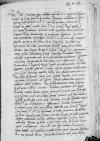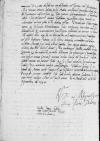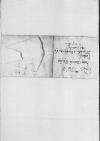Martinus, servant of Claude DODIEU de Vély ⌊MartinusMartinus, servant of Claude DODIEU de Vély ⌋ meus reddidit mihi litteras Dominationis Vestrae vigesima die, quam fuerant scriptae et serius profecto, quam cupiebam. Placuerunt nihilominus, ut solebant quaecumque proficiscebantur a Dominatione Vestra, sed illae imprimis, quae nuntiarunt, quam benigne et grate accepta fuerit Dominatio Vestra a serenissimo Sigismund I Jagiellon (Zygmunt I) (*1467 – †1548), King of Poland and Grand Duke of Lithuania (1506-1548); Duke of Głogów (Glogau) (1499-1506), Duke of Opava (1501-1506), Governor of Silesia (1504-1506); son of King Kazimierz IV Jagiellon and Elisabeth of Austria⌊regeSigismund I Jagiellon (Zygmunt I) (*1467 – †1548), King of Poland and Grand Duke of Lithuania (1506-1548); Duke of Głogów (Glogau) (1499-1506), Duke of Opava (1501-1506), Governor of Silesia (1504-1506); son of King Kazimierz IV Jagiellon and Elisabeth of Austria⌋. Quod etsi fore omnino sperabamus, cum ob vestra multa et praeclara merita, tum propter summam Sigismund I Jagiellon (Zygmunt I) (*1467 – †1548), King of Poland and Grand Duke of Lithuania (1506-1548); Duke of Głogów (Glogau) (1499-1506), Duke of Opava (1501-1506), Governor of Silesia (1504-1506); son of King Kazimierz IV Jagiellon and Elisabeth of Austria⌊regisSigismund I Jagiellon (Zygmunt I) (*1467 – †1548), King of Poland and Grand Duke of Lithuania (1506-1548); Duke of Głogów (Glogau) (1499-1506), Duke of Opava (1501-1506), Governor of Silesia (1504-1506); son of King Kazimierz IV Jagiellon and Elisabeth of Austria⌋ humanitatem et prudentiam singularem, fuit tamen mihi periucundum id intellegere ex litteris Dominationis Vestrae, cui ea de causa summopere gratulor et opto, ut ista fortuna diu et quam quietissime frui liceat. Nos post acceptas litteras vestras Nuremberg (Nürnberg, Norimberga), city in Germany, Bavaria⌊NurembergamNuremberg (Nürnberg, Norimberga), city in Germany, Bavaria⌋ profecti sumus, ubi cum Helius Eobanus Hessus (Eobanus Koch, Helius Coccius) (*1488 – †1540), neo Latin poet, humanist and writer, since 1509 secretary of bishop of Pomesania Hiob Dobeneck, lecturer of law at the University of Erfurt, 1526-1533 lecturer in the Nuremberg Gymnasium, 1530 visited Augsburg during the Imperial Diet, since 1536 professor of history at the University of Marburg; in 1512 attended the wedding of Sigismund I Jagiellon and Barbara Zápolya at Cracow (NDB, Bd. 4, s. 543-545; CE, vol. 1, p. 434-436)⌊EobanoHelius Eobanus Hessus (Eobanus Koch, Helius Coccius) (*1488 – †1540), neo Latin poet, humanist and writer, since 1509 secretary of bishop of Pomesania Hiob Dobeneck, lecturer of law at the University of Erfurt, 1526-1533 lecturer in the Nuremberg Gymnasium, 1530 visited Augsburg during the Imperial Diet, since 1536 professor of history at the University of Marburg; in 1512 attended the wedding of Sigismund I Jagiellon and Barbara Zápolya at Cracow (NDB, Bd. 4, s. 543-545; CE, vol. 1, p. 434-436)⌋ viximus satis suaviter. Incidit, ut plurimum, sermo de Dominatione Vestra, cuius memoriam mutuis poculis celebravimus, quam potui, frequentius. Reliquum temporis consumpsi in apparandis mihi necessariis ad istam expeditionem. Charles V of Habsburg (*1500 – †1558), ruler of the Burgundian territories (1506-1555), King of Spain as Charles I (1516-1556), King of Naples and Sicily, King of the Romans (1519-1530), Holy Roman Emperor of the German Nation (elected 1519, crowned 1530, abdicated 1556); son of Philip I the Handsome and Joanna the Mad of Castile⌊CaesarCharles V of Habsburg (*1500 – †1558), ruler of the Burgundian territories (1506-1555), King of Spain as Charles I (1516-1556), King of Naples and Sicily, King of the Romans (1519-1530), Holy Roman Emperor of the German Nation (elected 1519, crowned 1530, abdicated 1556); son of Philip I the Handsome and Joanna the Mad of Castile⌋ interea praecesserat, cum ego reversus Regensburg (Ratisbona), city in southeastern Germany, Bavaria, on the Danube river⌊RatisponamRegensburg (Ratisbona), city in southeastern Germany, Bavaria, on the Danube river⌋ XXV huius mensis offendi reverendum dominum Thomas Cranmer (*1489 – †1556), close associate of King Henry VIII Tudor, later advisor to Edward VI Tudor, burned at the stake during the brief restoration of Catholicism in England during Mary Tudor's reign; lecturer at Jesus College in Cambridge; 1532 archbishop of Canterbury⌊oratorem Henry VIII Tudor (*1491 – †1547), 1509-1547 King of England; son of Henry VII Tudor and Elizabeth of York⌊regis AngliaeHenry VIII Tudor (*1491 – †1547), 1509-1547 King of England; son of Henry VII Tudor and Elizabeth of York⌋Thomas Cranmer (*1489 – †1556), close associate of King Henry VIII Tudor, later advisor to Edward VI Tudor, burned at the stake during the brief restoration of Catholicism in England during Mary Tudor's reign; lecturer at Jesus College in Cambridge; 1532 archbishop of Canterbury⌋, qui reditum meum exspectabat. Cenavimus postridie apud me. Aderat Cornelis De Schepper (Cornelius Scepperus, Cornelis De Dobbele, Cornelius Duplicius) (*1503 – †1555), erudite, diplomat in the Habsburgs' service; close friend of Ioannes Dantiscus; initially in the service of Christian II of Oldenburg, King of Denmark; 1526 secretary and councillor to Emperor Charles V of Habsburg (CE, vol. 3, p. 218-220; DE VOCHT 1961, p. 15-24)⌊Cornelius SceperusCornelis De Schepper (Cornelius Scepperus, Cornelis De Dobbele, Cornelius Duplicius) (*1503 – †1555), erudite, diplomat in the Habsburgs' service; close friend of Ioannes Dantiscus; initially in the service of Christian II of Oldenburg, King of Denmark; 1526 secretary and councillor to Emperor Charles V of Habsburg (CE, vol. 3, p. 218-220; DE VOCHT 1961, p. 15-24)⌋ ab Ulm (Ulma), city in Germany, Baden-Württemberg, on the River Danube⌊UlmaUlm (Ulma), city in Germany, Baden-Württemberg, on the River Danube⌋ rediens et a Charles V of Habsburg (*1500 – †1558), ruler of the Burgundian territories (1506-1555), King of Spain as Charles I (1516-1556), King of Naples and Sicily, King of the Romans (1519-1530), Holy Roman Emperor of the German Nation (elected 1519, crowned 1530, abdicated 1556); son of Philip I the Handsome and Joanna the Mad of Castile⌊caesareCharles V of Habsburg (*1500 – †1558), ruler of the Burgundian territories (1506-1555), King of Spain as Charles I (1516-1556), King of Naples and Sicily, King of the Romans (1519-1530), Holy Roman Emperor of the German Nation (elected 1519, crowned 1530, abdicated 1556); son of Philip I the Handsome and Joanna the Mad of Castile⌋ praefectus machinis bellicis, quas ad exercitum deduxit. Nos illum postera die sumus secuti secundo Danube (Dunaj, Donau), river in central and eastern Europe⌊DanubioDanube (Dunaj, Donau), river in central and eastern Europe⌋ et hic tandem appulimus festinantes ad Charles V of Habsburg (*1500 – †1558), ruler of the Burgundian territories (1506-1555), King of Spain as Charles I (1516-1556), King of Naples and Sicily, King of the Romans (1519-1530), Holy Roman Emperor of the German Nation (elected 1519, crowned 1530, abdicated 1556); son of Philip I the Handsome and Joanna the Mad of Castile⌊caesaremCharles V of Habsburg (*1500 – †1558), ruler of the Burgundian territories (1506-1555), King of Spain as Charles I (1516-1556), King of Naples and Sicily, King of the Romans (1519-1530), Holy Roman Emperor of the German Nation (elected 1519, crowned 1530, abdicated 1556); son of Philip I the Handsome and Joanna the Mad of Castile⌋. Illic ubi advenerimus, occurret quidpiam, quod scribamus.
Ex France (Gallia, Francia), the kingdom⌊GalliaFrance (Gallia, Francia), the kingdom⌋ nuntiantur omnia feliciter et ad votum Francis I of Valois (*1494 – †1547), 1515-1547 King of France; son of Charles, Count of Angoulême, and Louise of Savoy⌊ChristianissimiFrancis I of Valois (*1494 – †1547), 1515-1547 King of France; son of Charles, Count of Angoulême, and Louise of Savoy⌋ succedere. Francis III of Valois (*1518 – †1536), Duke of Brittany, Dauphin of France; son of King Francis I of France⌊DelphinusFrancis III of Valois (*1518 – †1536), Duke of Brittany, Dauphin of France; son of King Francis I of France⌋ ex voluntate Francis I of Valois (*1494 – †1547), 1515-1547 King of France; son of Charles, Count of Angoulême, and Louise of Savoy⌊patrisFrancis I of Valois (*1494 – †1547), 1515-1547 King of France; son of Charles, Count of Angoulême, and Louise of Savoy⌋ sumpsit Rennes (Redones), city in France⌊RhedoniRennes (Redones), city in France⌋ coronam Brittany (Armorica, Bretogne), region in northwestern France⌊ducatus ArmoriciBrittany (Armorica, Bretogne), region in northwestern France⌋, quem incolae petierunt uniri fisco regio et in posterum censeri iuris salici ms. saliqui(!)
⌈salicisalici ms. saliqui(!)
⌉[1], quo quae provinciae censae sunt, dicuntur masculae et a regia corona numquam separantur, hoc illis liberaliter concessit Christianissimus, qui ex Angers (Andegavum, Andegavis), city in western France, the capital of the County of Anjou⌊AndegavisAngers (Andegavum, Andegavis), city in western France, the capital of the County of Anjou⌋ V huius mensis scribebat se properare Paris (Lutetia Parisiorum, Parisii), city in central France, on the Seine river, capital of France⌊LutetiamParis (Lutetia Parisiorum, Parisii), city in central France, on the Seine river, capital of France⌋, ut non esset exspectationi oratoribus, quos serenissimus Henry VIII Tudor (*1491 – †1547), 1509-1547 King of England; son of Henry VII Tudor and Elizabeth of York⌊Angliae Christianissimae maiestatiHenry VIII Tudor (*1491 – †1547), 1509-1547 King of England; son of Henry VII Tudor and Elizabeth of York⌋ suae destinavit, ut audio, conventuros, de die loco et forma congressus, qui speratur inter duos reges, qui valde et imprimis cupiunt communibus consiliis deliberare, quid ab eis praestari possit adversum Suleiman the Magnificent (*1494 – †1566), 1520-1566 Sultan of the Ottoman Empire⌊TurcamSuleiman the Magnificent (*1494 – †1566), 1520-1566 Sultan of the Ottoman Empire⌋ et alias Christianae reipublicae pestes. Id scilicet omnino agent, si colloquentur. Exspecto omni hora reditum secretarii mei, quem iam diu misi in France (Gallia, Francia), the kingdom⌊GalliamFrance (Gallia, Francia), the kingdom⌋. Si quid afferet, quod mereatur significari Dominationi Vestrae, non parcam litteris. Sed vellem, ut liceret mihi potius praesens  UUB, H. 154, f. 100v narrare Dominationi Vestrae, cuius desiderio ita distrahor, ut sperem me hoc, quicquid est a Vienna (Wien, Vienna), city in eastern Austria, on the Danube river⌊ViennaVienna (Wien, Vienna), city in eastern Austria, on the Danube river⌋ itineris, ad vos posse triduo conficere, praemissis equis, qui disponantur ad cursum et sint parati ad mutationem. Statueram item istic consumere totum biduum et eisdem equis revehi ea celeritate, ut non plus octo diebus absim. Verum, qui Poland (Kingdom of Poland, Polonia)⌊istius regionisPoland (Kingdom of Poland, Polonia)⌋ mores et festivam liberalitatem sunt experti, narrant eas esse blanditias et invitamenta puellarum vestrarum, ut verear, ne fiant illi viginti dies. Quo fit, ut non ausim, nisi impetrato prius privilegio, ut post biduum statim et si forte invitus extrudar ad viam ac dum istic ago, ne mihi ultra cyathos sex et eos quidem aqua dilutos una die bibere liceat. Ea condicione facta audebo forsan, ceterum et hoc adiecto, ne mihi liberum sit renuntiare privilegio nec possit etiam serenissimus mecum in hac causa dispensare. Ita mihi plane metuo, ita parum fido, quod si istuc veniam, praemoneo me fidei Dominationis Vestrae animam meam commissurum. Viderit postea Dominatio Vestra, quid de amico velit statuere ac si placet, interim rescribat aliquid. Petit dominus Thomas Cranmer (*1489 – †1556), close associate of King Henry VIII Tudor, later advisor to Edward VI Tudor, burned at the stake during the brief restoration of Catholicism in England during Mary Tudor's reign; lecturer at Jesus College in Cambridge; 1532 archbishop of Canterbury⌊orator AngliaeThomas Cranmer (*1489 – †1556), close associate of King Henry VIII Tudor, later advisor to Edward VI Tudor, burned at the stake during the brief restoration of Catholicism in England during Mary Tudor's reign; lecturer at Jesus College in Cambridge; 1532 archbishop of Canterbury⌋ praesens suis verbis dicam salutem Dominationi Vestrae, quae bene valeat ac me, ut facit, amat.
UUB, H. 154, f. 100v narrare Dominationi Vestrae, cuius desiderio ita distrahor, ut sperem me hoc, quicquid est a Vienna (Wien, Vienna), city in eastern Austria, on the Danube river⌊ViennaVienna (Wien, Vienna), city in eastern Austria, on the Danube river⌋ itineris, ad vos posse triduo conficere, praemissis equis, qui disponantur ad cursum et sint parati ad mutationem. Statueram item istic consumere totum biduum et eisdem equis revehi ea celeritate, ut non plus octo diebus absim. Verum, qui Poland (Kingdom of Poland, Polonia)⌊istius regionisPoland (Kingdom of Poland, Polonia)⌋ mores et festivam liberalitatem sunt experti, narrant eas esse blanditias et invitamenta puellarum vestrarum, ut verear, ne fiant illi viginti dies. Quo fit, ut non ausim, nisi impetrato prius privilegio, ut post biduum statim et si forte invitus extrudar ad viam ac dum istic ago, ne mihi ultra cyathos sex et eos quidem aqua dilutos una die bibere liceat. Ea condicione facta audebo forsan, ceterum et hoc adiecto, ne mihi liberum sit renuntiare privilegio nec possit etiam serenissimus mecum in hac causa dispensare. Ita mihi plane metuo, ita parum fido, quod si istuc veniam, praemoneo me fidei Dominationis Vestrae animam meam commissurum. Viderit postea Dominatio Vestra, quid de amico velit statuere ac si placet, interim rescribat aliquid. Petit dominus Thomas Cranmer (*1489 – †1556), close associate of King Henry VIII Tudor, later advisor to Edward VI Tudor, burned at the stake during the brief restoration of Catholicism in England during Mary Tudor's reign; lecturer at Jesus College in Cambridge; 1532 archbishop of Canterbury⌊orator AngliaeThomas Cranmer (*1489 – †1556), close associate of King Henry VIII Tudor, later advisor to Edward VI Tudor, burned at the stake during the brief restoration of Catholicism in England during Mary Tudor's reign; lecturer at Jesus College in Cambridge; 1532 archbishop of Canterbury⌋ praesens suis verbis dicam salutem Dominationi Vestrae, quae bene valeat ac me, ut facit, amat.
 UUB, H. 154, f. 100v narrare Dominationi Vestrae, cuius desiderio ita distrahor, ut sperem me hoc, quicquid est a
UUB, H. 154, f. 100v narrare Dominationi Vestrae, cuius desiderio ita distrahor, ut sperem me hoc, quicquid est a 

